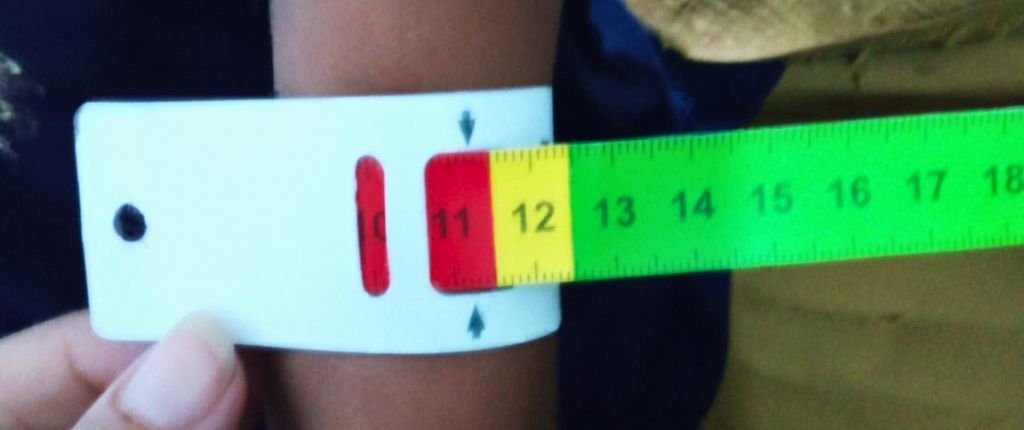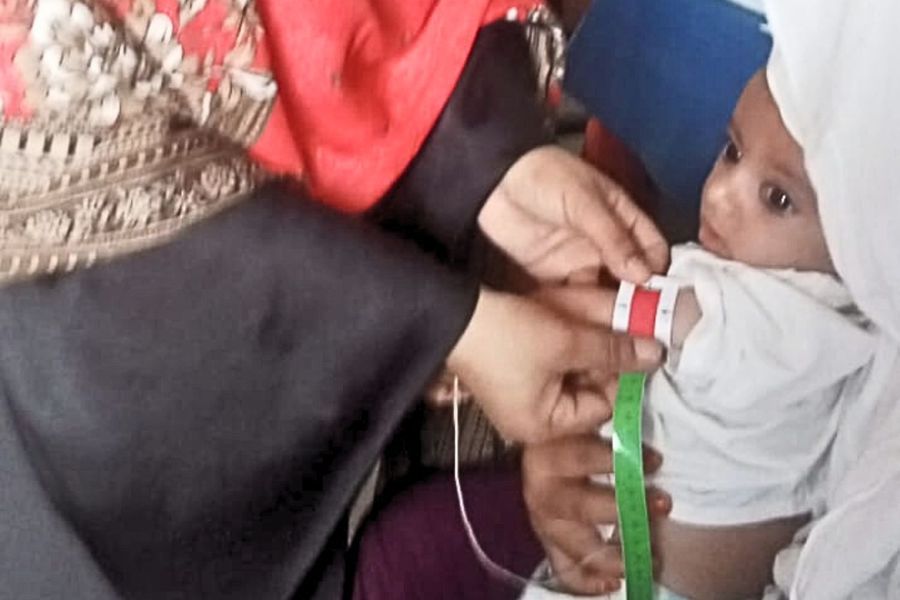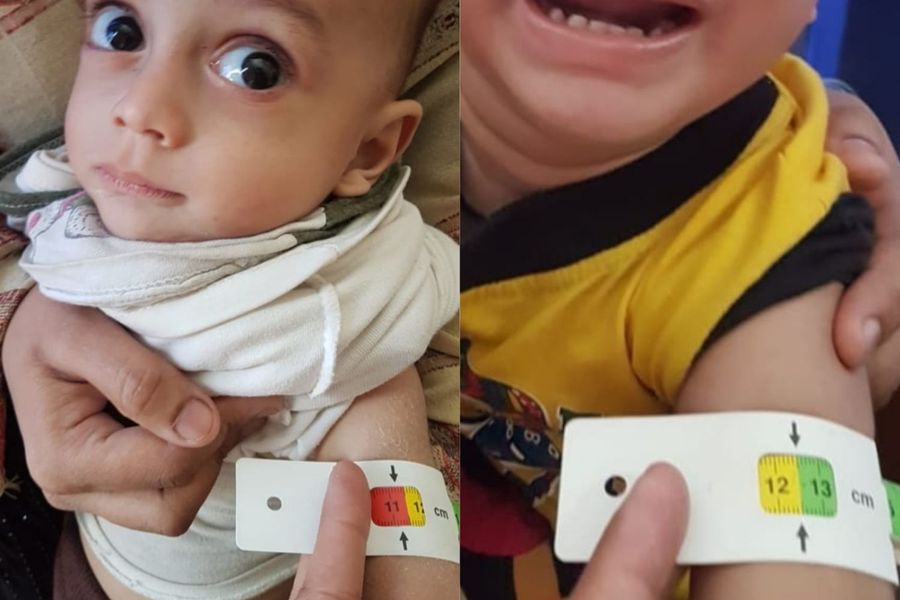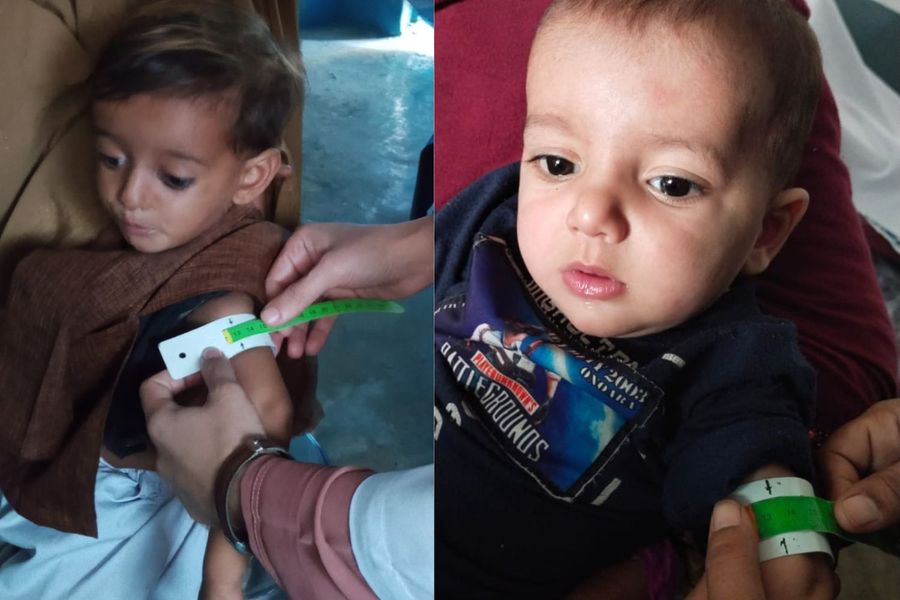
Successfully battling child malnutrition in Pakistan

It is July 2023 when the medical staff in our health station in a refugee camp in northern Pakistan slings a measuring tape around the upper arm of a painfully thin looking little boy. His name is Sardar, and he is one year old. Our colleagues want to determine whether he is malnourished. That is what the special measuring tape called MUAC tape is used for. The acronym stands for “Mid-Upper Arm Circumference”, a measurement with which, in addition to body weight, the nutritional status of a child between six months and five years can be assessed quickly and reliably.
The MUAC tapes have a green sector for 12,5 cm and more – a healthy circumference. Then follows a yellow part – 12,5 to 11,5 cm. When the tape around Sardars upper arm is pulled tight and the measurement can be taken, the color of the tape is red at only 9,5 cm. What was to be expected by his looks is verified: Sardar is severely malnourished. At that time, he weighs only 6 kg. Medical and food therapeutic treatment is now vital.
The team in our health station, after conducting initial treatment steps, transfers Sardar to a government-run health institute for nutrition therapy. This therapy was specifically developed to treat severe malnutrition with “Ready-to-Use Therapeutic Food”. Additionally, our staff monitors his progress closely.
Once treated, many children recover remarkably fast

Sardar proved to be a resilient child and his condition improved quickly. In August, he had gained 1 kg thanks to the therapeutic food, and his MUAC, although still in the red zone, was 10,5 cm. To the great relief of his parents, in mid-September Sardar had already reached the healthy end of the yellow part of the tape: 12,5 cm. He was transferred to Moderately Acute Malnutrition services, ensuring both therapeutic and preventive measures to guard against renewed malnutrition. By the end of September, Sardar had made it: 13,5 cm and 9 kg. He now has a good chance for a healthier and hopefully brighter future.
Many Afghan refugee children living in and around the various camps in Pakistan undergo the same challenges as Sardar:
17-month old Hazrat Bilal weighed only 7 kg with a MUAC of 11,3 cm and had severe diarrhea when his parents brought him to our health station. Haya Noor, at 18 months, was so weakened that she had stopped eating altogether when her worried parents sought our support. She weighed 10 kg then, her MUAC measurement was 10,5 cm.
Like Sardar, Hazrat Bilal and Haya Noor gained weight quickly and, after a few months of treatment, are now on a good way to leave malnutrition behind them for good.
Knowledge can save lives

In addition to the provision of therapeutic nutrition and healthy food, the procurance of knowledge about a healthy, balanced diet is just as essential so ensure the health and wellbeing of parents and children. Especially during pregnancy and for small children, food alone is not enough, it needs to be the right food. For first-time parents who, due to flight and displacement, have lost contact to older, more experienced family members, it is particularly difficult to get information about childcare, nursing and nutrition. Many people in Afghanistan and Pakistan cannot read or write, most of them women and girls, who are often denied access to school education – and who are usually the main caretakers in the families.
For 16-month-old Uzaire, this lack of knowledge caused severe malnutrition. His mother had discontinued breastfeeding when Uzaire was only six months old, and from then on fed him a grain-based diet with foods like cereal, biscuits, chips and cupcakes, with minimal inclusion of fruits and vegetables. Slowly, but steadily his health started to deteriorate, and he lost his appetite. When his worried parents came to the camp clinic, Uzair's initial diagnosis revealed a MUAC measuring just 11.2 cm, and a weight of only 10 kg. Malteser International provided the mother with counselling on foods suitable for her child's age, encompassing all essential food groups and provided as small, frequent, homemade meals throughout the day. After only two and a half months, Uzair demonstrated remarkable improvement. His weight increased, and his MUAC measurement indicated a full recovery from malnutrition.
Hunger and malnutrition in Pakistan

Even before the disastrous flood of 2022 more than one fifth of the Pakistani people did not have adequate access to food. The flood then destroyed large parts of the livelihoods of the population, and spring and summer of 2023 brought an earthquake, a cyclone and heavy storms that further destroyed the infrastructure and farmlands. As of June 2023, more than 10 million people in Pakistan are affected by severe food insecurity. In those parts of the country that were hit hardest by the flood, more than 3,5 million children are severely malnourished. Almost half the deaths amongst children under five years of age can be ascribed to malnutrition. (Source: BMZ)
We provide essential humanitarian aid, basic health services and care for malnourished children and pregnant women in the province of Khyber Pakhtunkhwa. All services are offered to the Afghan refugees as well as to the Pakistani population.
The stories of Sardar, Hazrat Bilal, Haya Noor and Uzaire are exemplary for the experiences of uncounted children in Pakistan and Afghanistan. But they do not only show us the desolate situation of refugees and people living in areas of conflict, they open our eyes for the strength and resilience with which the people meet these challenges and problems. Thanks to the support of our donors like the EU and through private donations, we are able to provide parents and children in Pakistan with the necessary support in their fight against malnutrition.








